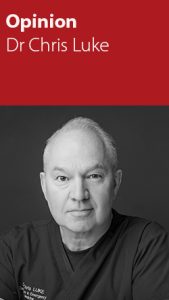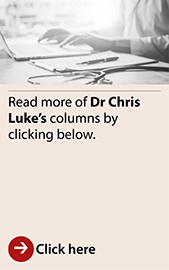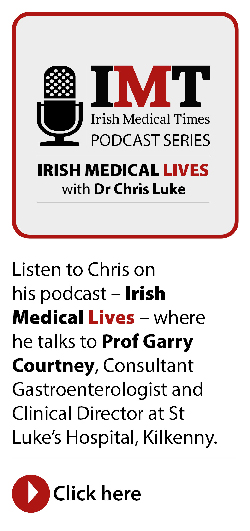Dr Chris Luke wonders if the child of rigor was thrown out with the polluted bathwater of clerical abuse in public hospitals
It virtually handed me by, however the phrase “Test your privilege!!!” was throughout social media a decade in the past. Considering again, it was round then that pals in London started to randomly pepper conversations with the phrase, in mocking echoes of the often-heated on-line interactions described dubiously as ‘debates’. Allegedly deployed to remind individuals – politely – that they is likely to be a little bit extra advantaged than others when it got here to political discourse, it shortly turned a verbal cudgel used to silence opponents, particularly (as my darling daughters remind me often) those that are pre-eminently privileged in Western society: the middle-aged, middle-class, heterosexual white man, who’s (as the ladies inform me), ‘pale, stale, and male, such as you, Daddy!’
 Now, in reality, for a few years, I felt something however privileged, setting apart the immense blessing of 4 wholesome offspring, a long-suffering and supportive – nay, saintly – spouse, and the tail-wagging welcome from the canine after I bought residence from work. ‘Burnout’ was the first reflex rationalization for my deep emotions of inadequacy, till – within the midst of a real debate on-air (suffice to say it was to do with sources of caseload) – my interlocutor, a person I’d by no means met, instantly mentioned “ what your downside is, Chris? You’ve bought a ‘siege mentality!’” By this he meant the hypervigilant and uber-defensive mindset typically present in older emergency physicians following a long time spent in emergency departments (EDs).
Now, in reality, for a few years, I felt something however privileged, setting apart the immense blessing of 4 wholesome offspring, a long-suffering and supportive – nay, saintly – spouse, and the tail-wagging welcome from the canine after I bought residence from work. ‘Burnout’ was the first reflex rationalization for my deep emotions of inadequacy, till – within the midst of a real debate on-air (suffice to say it was to do with sources of caseload) – my interlocutor, a person I’d by no means met, instantly mentioned “ what your downside is, Chris? You’ve bought a ‘siege mentality!’” By this he meant the hypervigilant and uber-defensive mindset typically present in older emergency physicians following a long time spent in emergency departments (EDs).
It was an odd type of epiphany, however an necessary one, nonetheless, and it had a remarkably enduring influence on me. Afterwards, it jogged my memory first of a poster on the wall of the Medical Illustration Division on the Royal Liverpool Hospital within the Nineties. This featured a drawing of a forlorn fuzzy-headed stick man, saying: “This morning I awakened with one nerve left. And now you’re getting on it….”. (The recollection nonetheless makes me snort.) However the second impact was to immediate me to hunt – and discover – life-changing assist from the Occupational Well being Division, courtesy of Professor John Gallagher, a person with infinite persistence and a beacon of compassion and hope for weary colleagues.
That was a very good few years in the past. And, fortunately, I’ve managed to attenuate the worst manifestations of burnout (the fashion on the system has misplaced a few of its sting, and I sleep higher with the lowered publicity to the soul-crushing ‘politics’ in healthcare). Sadly, although, I nonetheless expertise signs of that siege mentality, borne of years flailing round in swamped and harmful EDs, unable to ship the optimum affected person care so clearly set out on the prime of my psychological and religious agenda.
It’s this corrosive mindset that has lengthy had me believing that our acute public healthcare system is in a doom loop; haemorrhaging treasured employees, each younger and outdated; failing – and arousing a justifiably widespread dread in – sufferers and healthcare professionals alike (at the least within the front-facing pointy little bit of the general public well being service).
It was additionally this mind set that had me anticipating the worst after I was admitted just lately to hospital, for a number of days’ ‘exams’. And after I say I used to be anticipating the worst, I’m speaking about my present expectations of the general public well being service in Eire (and the NHS), the place I spent over three and a half a long time of my life.
So the ‘worst’ meant that I’d get no affirmation from the admissions workplace of the hospital when or in the event that they have been anticipating me; no notes could be made up for me as a result of they weren’t anticipating me or had not bought spherical to it; I’d spend hours ready in a loud and clammy ready space, in all probability standing, earlier than being taken finally by a harried porter to a ward upstairs, the place one other lengthy wait to be observed would ensue; lastly a mattress could be discovered, though not essentially ‘made up’, earlier than I endured one other lengthy wait to be seen by an exhausted nurse or intern. Oh, and it is likely to be days earlier than I noticed ‘my’ advisor. After which extra days – or weeks – if I wanted additional session and even barely unique scanning.
However, within the occasion, it transpired that, as soon as once more, I used to be ‘catastrophising’.
 What truly occurred was virtually surprising. After presenting myself to the entrance corridor reception desk, I used to be invited politely to attend within the adjoining clear, brilliant and quiet ready room, the place there have been magazines to learn, a water-cooler, and TV with the amount turned down, and from whence I used to be known as by the admissions officer a couple of minutes later.
What truly occurred was virtually surprising. After presenting myself to the entrance corridor reception desk, I used to be invited politely to attend within the adjoining clear, brilliant and quiet ready room, the place there have been magazines to learn, a water-cooler, and TV with the amount turned down, and from whence I used to be known as by the admissions officer a couple of minutes later.
Admission kind duly crammed and signed, I used to be taken a couple of minutes later by the identical courteous employees member as much as the second-floor ward and proven to my freshly-made mattress. Thereafter, I used to be handled with the utmost care by a stream of well mannered healthcare professionals of each rank and type. And over the subsequent few days, I had blood exams, scans, extra blood exams, extra scans, effectively and on the time foretold, together with periodic important signal measurements, and specialists popping in from time to time to see how I used to be doing, to look at me, and to elucidate what the newest scientific issues and investigative findings have been suggesting, together with hand-drawn diagrams on continuation sheets. All of this was finished with immense courtesy, a smile and a nicely-judged dose of banter.
And, as if the entire expertise wasn’t laborious sufficient to consider, the meals I’d chosen from a surprisingly in depth menu was tasty and comforting (particularly as I felt myself changing into increasingly more ‘institutionalised’ with the passing days).’
However (in fact there’s a ‘however’), there are ‘disclosures’. The hospital was considered one of Eire’s premier ‘unbiased’ establishments, my situation was not of sudden onset, and I had non-public medical health insurance. Furthermore, I’m a ‘medical man’ nearer to seventy than sixty, and most of the immensely amiable professionals have been pleasant former colleagues, or at the least they could have been inclined to deal with me a little bit extra fastidiously than may in any other case have been the case.
Nonetheless, as I rely my blessings (together with the varied non-drastic diagnoses), I feel it is very important put my ‘privilege’ into some perspective. Round 2.4 million clients in Eire had non-public medical health insurance insurance policies in 2022, representing practically half the inhabitants. So I’m not in some type of tiny ‘minority’ on the subject of entry to personal healthcare.
And the truth that I encountered so many smiles is defined by an extended profession within the public hospitals, the place virtually all of these acquainted faces had began, and the place they and I spent an excessive amount of time collectively, ‘combating the great battle’.
 It’s a truism that cash appears to make the world of personal drugs go spherical, however my subjective expertise of (glorious) inpatient care over a number of days was not decided primarily by the services, the meals, or the fellowship examinations undertaken by those that handled me. Actually, what impressed me most was the friendliness, cleanliness and well-ordered effectivity of the hospital. Frankly, it jogged my memory of my alma mater, St Vincent’s Hospital in Dublin, circa 1980-1983, a public hospital I affiliate with (very) strict nuns, immaculate (starched) uniforms, white coats and the very best requirements.
It’s a truism that cash appears to make the world of personal drugs go spherical, however my subjective expertise of (glorious) inpatient care over a number of days was not decided primarily by the services, the meals, or the fellowship examinations undertaken by those that handled me. Actually, what impressed me most was the friendliness, cleanliness and well-ordered effectivity of the hospital. Frankly, it jogged my memory of my alma mater, St Vincent’s Hospital in Dublin, circa 1980-1983, a public hospital I affiliate with (very) strict nuns, immaculate (starched) uniforms, white coats and the very best requirements.
Now, as somebody who spent a few of his earliest years in a Catholic ‘orphanage’, and his early life in a distinctively Catholic faculty (the place ‘crucial journalist of the final thirty years’, Mary Raftery, the producer of the history-shaking sequence concerning the worst of Irish Catholicism – States of Concern – completed her education), I’m not about to name for the nuns of yore to take cost once more of our hospitals. However after I see the ‘state’ of lots of our public hospitals (assume filthy bogs, sufferers combating within the ED waiting-room, employees combating for beds, small and enormous indignities seemingly in every single place, and so many sufferers coming to hurt), I generally surprise if the child of rigor was thrown out with the polluted bathwater of clerical abuse.
So sure, I’ve once more checked my privilege. It was an infinite honour to serve within the public well being service, particularly in that terribly noble self-discipline, emergency drugs. And my ardour for social justice and excellence in public service hasn’t diminished. However spending time in a personal hospital, that mixed old school requirements with the newest know-how has made me realise that it was solely the bits that I may ‘see’ that have been as unhealthy as I’ve been saying for years. In different components of the ecosystem, Irish healthcare is on a par with the most effective on this planet. And appreciating that actuality has been each a massively encouraging privilege – and a profoundly thought-provoking revelation. ![]()